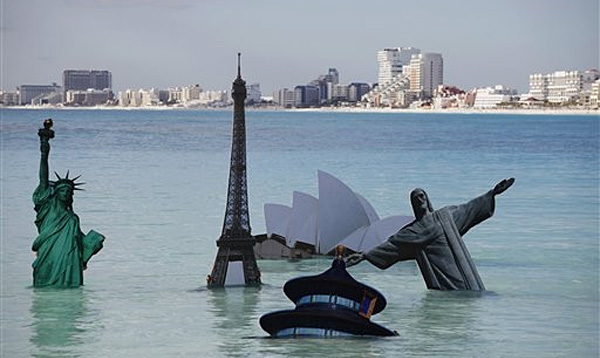
|  |  |  Editorials | Environmental Editorials | Environmental  
Climate Talks Intensify; Negotiators See Progress
 Associated Press Associated Press
go to original
December 10, 2010


| | Environmental activists from Greenpeace demonstrate by holding images of world landmarks in the water during the United Nations Climate Change Conference in Cancun, Mexico, Wednesday Dec. 8, 2010. According to the UN weather agency, 2010 is "almost certain" to rank among the three hottest years on record, and in a report issued Tuesday experts said glaciers in southern South America and Alaska's coastal mountains have been losing mass faster and for longer than glaciers elsewhere in the world. (Associated Press) |  |
Cancun, Mexico - Negotiators reported progress Thursday at the U.N. climate conference, setting the stage for agreements on a support fund for poorer nations and other steps easing global warming's impact. The complex talks stretched deep into the night to try to meet a Friday deadline.

Once again this year the annual negotiations under the U.N. climate treaty won't produce an overarching, legally binding deal to slash emissions of carbon dioxide and other global warming gases. From the start, the talks focused instead on a package of secondary items, including setting up the "green fund" for developing countries.

In that and in a half-dozen other areas, world environment ministers and other delegates were still haggling late Thursday over the wording of texts. But the conference president, Mexican Foreign Secretary Patricia Espinosa, sounded an upbeat note.

"The reports I have gotten are positive," she told a late-night meeting of parties to the 193-nation treaty. "A broad and balanced package of decisions is, indeed, within our grasp."

On the key issue of a green fund, Bangladesh's state minister for the environment, Mohammed Hasan Mahmud, reported to the session that "we have narrowed down our gaps and there is convergence on establishing the fund," but details remained to be resolved.

Earlier, Akira Yamada of Japan, whose government's resistance to committing to future emissions cuts has slowed the talks, predicted the conference might have to extend into Saturday.

Yamada did say he believed parties could reach agreement. The talks were difficult, he said, but "we are engaging in how we can find good wording which can accommodate not only Japan but other countries."

As some 15,000 delegates, environmentalists, business leaders, journalists and others met at this Caribbean resort, carbon dioxide and other global warming gases, byproducts of industry, vehicles and agriculture, continued to accumulate in the atmosphere, barely abated by modest emission reductions undertaken thus far.

Scientists say temperatures could rise by up to 6.4 degrees Celsius (11.5 degrees Fahrenheit) in this century without deeper cuts, leading to serious damage to coastlines, human health, agriculture and economies in general.

"We all will leave Cancun knowing very clearly that we have not very significantly changed the time window in which the world will be able to address climate change," Achim Steiner, the head of the U.N. Environment Program, told reporters.

Bolivia's President Evo Morales, addressing the full conference, cited families already being deprived of water because of warming and drought, and islanders facing the loss of homes from seas rising from global warming.

If governments shun strong, mandatory emissions reductions, "then we will be responsible for `ecocide,' which is equivalent to genocide because this would be an affront to mankind as a whole," the Bolivian leader said.

Last year's climate summit in Copenhagen, Denmark, was supposed to have produced a global pact under which richer nations, and possibly some poorer ones, would be required to rein in greenhouse gases.

That agreement would have succeeded the 1997 Kyoto Protocol, which mandated modest emissions reductions by developed nations that expire in 2012. Alone in the industrial world, the U.S. rejected Kyoto, complaining that emerging economies, such as China and India, should also have taken on obligations.

The 2009 summit produced instead a "Copenhagen Accord" under which the U.S., China and more than 80 other nations made voluntary pledges to reduce emissions, or at least to limit their growth.

In a sign of the sensitivity of even voluntary pledges, the U.S. and China were squabbling in Cancun over an effort to "anchor" them in a fresh U.N. document. The Chinese want separate listings to maintain a distinction between developing and developed countries, and the Americans want a single integrated list.

Japan, meanwhile, has resisted language that would commit it to a second period of Kyoto-style emissions reductions beyond 2012.

Yamada said the 37 industrialized countries that ratified Kyoto now account for only 27 percent of global greenhouse gas emissions. It's time for others — the U.S. and China included — to join in mandatory cutbacks, he said.

"For an ultimate goal, we are aiming for a single legally binding instrument, in which all major emitters participate," the Japanese negotiator told reporters.

The European Union, meanwhile, joined with small island states and Costa Rica in proposing that parties commit to taking up a "legally binding instrument" at next year's climate conference in Durban, South Africa.

The U.S. delegation also seeks detailed provisions for monitoring, reporting and verification, called "MRV," of how China and other developing nations are fulfilling their voluntary Copenhagen pledges. A leading environmentalist here accused American negotiators of blocking a decision on the green fund in "the kind of brinkmanship that costs lives."

"The United States continues to hold these important decisions hostage in an effort to get what they want on transparency and MRV. This is unacceptable," said Jeremy Hobbs, executive director of Oxfam International.

The green fund would help developing nations buy advanced clean-energy technology to reduce their own emissions, and to adapt to climate change, by building seawalls against rising seas, for example, and upgrading farming practices to compensate for shifting rain patterns. Under the Copenhagen Accord, richer nations promised to provide $100 billion a year for the fund by 2020. |

 |
|  |



